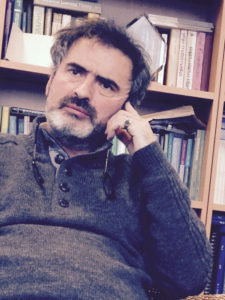 The UNESCO Chair in OER at Université de Nantes aims at developing technologies and research towards these technologies for open education resources in the training of teachers.
The UNESCO Chair in OER at Université de Nantes aims at developing technologies and research towards these technologies for open education resources in the training of teachers.
Activities related with the chair consist of contributing to (i) the succes of Class’Code, a French national project where blended MOOCs are provided with the goal of contributing to the training of teachers and educators for coding and computational thinking, and (ii) analyzing Class’Code, documenting it, helping its openness, and (iii) disseminating the model.
The Chair is Colin de la Higuera, professor in Computer Science at University of Nantes and in the Laboratoire des Sciences du Numérique de Nantes. His research field is Machine Learning, a field in which he has collaborated with researchers from more than 20 countries over the years. He is the author of two books and many research papers.
He has been the founding President of the learnt Société informatique de France, and contributed to design and launch the Class’Code project whose goal is to train teachers and educators to code and computational thinking.
Colin de la Higuera is also trustee of the Knowledge for All Foundation and currently works with European actors on indexing and accessing OER in a more helpful way.
Some years ago the teacher would prepare her new class by using a textbook, searching through her library, or the library close to her home, perhaps discussing with her close colleagues and taking advantage of her own personal experience.
The advent of Internet has changed that, like many other things. In 2017 the teacher is going to use the internet as a set of textbooks, a huge library and her colleagues now live at the other end of the planet.
But this apparent richness is of little use if the right resources are too hard to find. How does one know that a video is useful without watching it? How can one believe that the lecture given by an unknown is correct? How do we discover the resource we need between thousands of others? And how do we find the resource which is open and we can therefore freely redistribute to our students?
To these difficulties we can add another one: how can we build a new resource in such a way that we am allowed to share it with others? With an answer to this question the teacher ceases to be a mere consumer and becomes a creator.
These questions are economic, political, pedagogical. But also technological: where are the tools enabling the teacher to make full use of free knowledge?
Furthermore, we would like these tools and the process itself to take place with no added cost: the challenge is that building open educational resources and using them should be as simple and as cost-free as possible.
The issues raised here are backed by many institutions: Unesco, the OECD,…, and many countries who signed the Paris 2012 declaration.
The Unesco Chair on Technologies for the Training of Teachers by Open Educational Resources, supported by the Nantes University Foundation, aims at contributing to this challenge.
The Chair will build its activities upon Unesco’s international dimension and the research cooperation maintained over the years with many actors. The Chair will benefit from the favourable ecosystem one can find in Nantes on these questions and more particularly of its research teams (LS2N, CREN,…) as well as the projects these are involved in (Class’Code, Labex CominLabs, …).
The Chair’s founding ideas – Class’Code
In October 2016, University Presidents Frédérique Vidal and Olivier Laboux, Chair-holder Colin de la Higuera, and many other presidents and directors of Universities, research institutes, learnt societies, and associations representing formal and informal education in France wrote in the French newspaper Le Monde:
Le chantier pour l’éducation est immense car il faut faire enseigner cette nouvelle matière sans avoir vraiment assez d’éducateurs et d’enseignants formés pour cela. En effet, la vitesse à laquelle les technologies numériques ont changé notre quotidien a été bien supérieure à celle du changement de la formation des enseignants.
Il est pourtant aujourd’hui indispensable à la fois de commencer à éduquer les enfants et de former les éducateurs et enseignants qui vont, dans les écoles et les collèges, mais aussi dans le contexte des activités périscolaires, se trouver face à ces enfants.
Class’Code is a free innovative blended learning program that places computer science at the heart of our educational system; the goal is to train members of the educational \& informatics communities to teach young people from 8 to 14 basic programming and computer science. This includes creative programming, information coding, and familiarization with networks, fun robotics, and the related impacts of technology in our society. It will help familiarise our children with the concept of algorithms, computational thinking and thus have control over the digital world.
The Class’Code project is supported by both academic and industrial federations in computer science, led by the SIF (Société informatique de France) and managed by Inria (the French Research Institute in computer science and applied mathematics). Magic Makers is in charge of the pedagogy, Open Classrooms drives the production while the deployment on the territories is under the leadership of Les Petits Débrouillards.
Computational Thinking
Whereas coding, programming, computing are the popular words used to express the competences to be acquires at an early age in order to be able to not be dependent in the information society, it is now becoming understood that the knowledge is less computer oriented and closer to problem solving activities. Computational thinking (in French, Pensée Informatique) is the set of processes one uses to solve a problem through representing the data as information, algorithmically solving the associated problem and restituting the result through some device. It is now strongly argued that it is a paradigm to be acquired at school.


